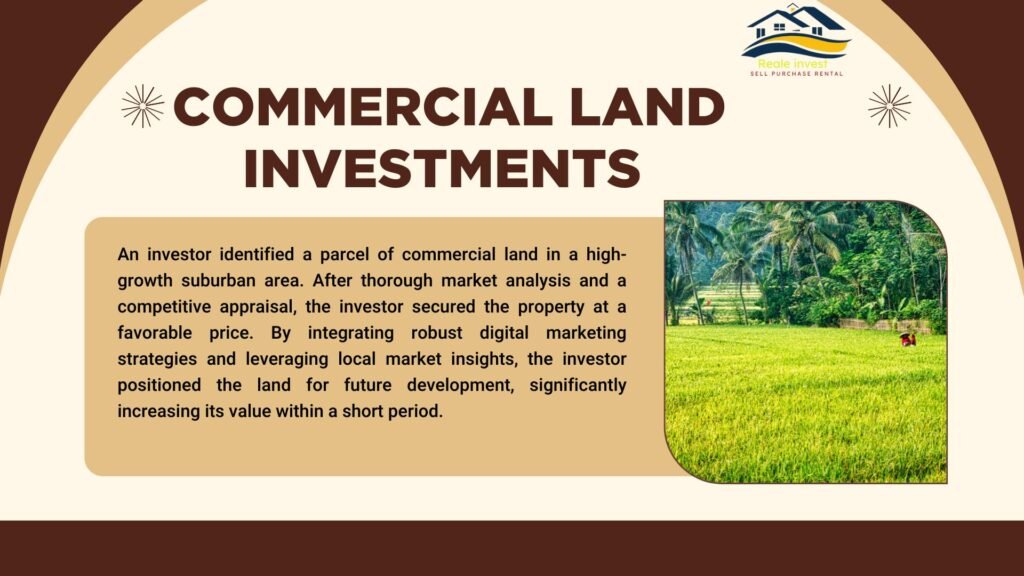RealeInvest is a comprehensive website providing accurate information on real estate and tourist bookings, from buying and investment tips to real estate financing

Investing in commercial land is a powerful way to diversify your portfolio, generate long-term income, and secure tangible assets for the future. Whether you’re a seasoned investor or new to the market, knowing how to buy commercial land can set you on the path to financial success. In today’s guide, we will walk you through every step of the process, from identifying opportunities to closing the deal. We’ll cover everything you need to know about commercial land to buy, buy commercial land, and the art of buying commercial land
Table of Contents
1. Recognizing the Value of Commercial Land
1.1 Commercial land: what is it?
Commercial land refers to parcels that are zoned for business purposes. Unlike residential properties, commercial land can be used for a variety of activities including retail, office space, industrial, and mixed-use developments. When you buy commercial land, you’re investing in an asset that can potentially generate significant returns through leasing, development, or future resale.
1.2 The Advantages of Commercial Land Investments
Investing in commercial land offers several advantages:
- Potential for High Returns: With the right location and development plan, commercial land investments can yield higher returns compared to other real estate assets.
- Diversification: It provides diversification in your investment portfolio, reducing overall risk.
- Tangible Asset: Commercial land is a tangible asset that appreciates over time.
- Flexibility: Owners have the flexibility to develop the land, lease it to businesses, or hold it as a long-term investment.
- Leverage and Financing: Investors can often secure favorable financing options for commercial land, enhancing purchasing power.
1.3 Economic Factors and Market Trends
Understanding current market trends is crucial when you decide to buy commercial land. Key economic indicators include:
- Local Zoning Regulations: Zoning laws can greatly influence land value and future development opportunities.
- Infrastructure Development: Proximity to highways, public transit, and other infrastructure can boost land value.
- Economic Growth: Regions with strong economic growth often experience rising demand for commercial space.
- Supply and Demand: Limited supply in high-demand areas can drive up prices, while oversupply might offer bargains.
2. Getting Ready to Purchase Commercial Property

2.1 Establishing Investment Objectives
Before embarking on your journey to buy commercial land, define your investment objectives:
- Short-Term vs. Long-Term: Are you looking for quick profits through resale, or long-term income via leasing and development?
- Risk Tolerance: Determine your risk appetite. Commercial land investments may require more patience but can offer higher rewards.
- Budget and Financing: Establish your budget, keeping in mind that financing options such as commercial loans or seller financing might be available.
2.2 Due Diligence and Research
Conduct thorough research to identify potential opportunities:
- Market Analysis: Study local market conditions, trends, and comparables in the area where you want to invest.
- Site Visits: Visit potential properties to assess their condition, location, and access to amenities.
- Legal Considerations: Ensure the land has clear titles, and check for any liens or disputes that may affect your purchase.
- Environmental Assessments: Depending on the intended use, environmental studies may be required to verify that the land is free of contaminants.
2.3 Building a Robust Financial Report
Lenders and sellers will assess your ability to finance the purchase:
- Credit Score: A strong credit score can secure lower interest rates.
- Financial Documentation: Prepare your financial statements, tax returns, and a detailed business plan.
- Proof of Funds: Demonstrating that you have the necessary capital or pre-approval for financing can strengthen your negotiation position.
3. How to Purchase Commercial Land: A Comprehensive Guide
3.1 Selecting the Proper Real Estate
Start your search by focusing on the right attributes:
- Location: Look for properties in high-growth areas with good infrastructure.
- Zoning: Ensure the land is zoned appropriately for your intended use (e.g., retail, office, industrial).
- Size and Shape: Consider the physical dimensions of the land, which can affect its development potential.
- Price Trends: Monitor recent sales data to understand market value and negotiate effectively.
3.2 How to Pay for Your Purchase
Securing financing is a critical step when you buy commercial land:
- Traditional Bank Loans: Approach banks for commercial loans, which may offer competitive rates if you have a strong financial profile.
- Seller Financing: Some sellers may be willing to finance the sale, allowing you to pay in installments.
- Alternative Financing: Explore options such as crowdfunding, private equity, or joint ventures with other investors.
- No-Money-Down Strategies: In some cases, you can leverage creative financing methods that reduce or eliminate the need for a large down payment.
3.3 Making a Proposal
Once you’ve identified a promising property, it’s time to make an offer:
Professional Appraisal: Get an appraisal to determine a fair market value.
Negotiation: Use your research and appraisal as leverage during negotiations.
Contingencies: Include contingencies for financing, inspections, and clear title verification to protect your investment.
Formal Contract: Work with a real estate attorney to draft a comprehensive purchase agreement that outlines all terms clearly.
3.4 Sealing the Agreement
The closing process can be complex, so follow these steps carefully:
- Final Inspections: Conduct any final inspections and environmental assessments.
- Secure Financing: Finalize your financing arrangements and ensure all funds are in place.
- Review Legal Documents: Carefully review all closing documents with your attorney.
- Transfer of Ownership: Once everything is in order, sign the necessary paperwork and transfer ownership.
4. Commercial Land Investment Marketing Techniques

4.1 Making Use of Digital Marketing Strategies
Maximize exposure to potential buyers and investors by leveraging digital marketing:
- Search Engine Optimization (SEO): Optimize your property listings and website with targeted keywords like buy commercial land and how to buy commercial land to capture high CPC/CTR traffic.
- Content Marketing: Publish blog posts, articles, and case studies that detail your investment journey and highlight the benefits of commercial land.
- Social Media: Use platforms like LinkedIn, Facebook, and Instagram to share success stories, property updates, and market insights.
4.2 Making Interesting Listings
A well-crafted property listing can significantly impact your sale:
- High-Quality Visuals: Use professional photography, drone footage, and virtual tours to showcase the property.
- Detailed Descriptions: Provide comprehensive details about the land’s location, zoning, potential uses, and surrounding amenities.
- Interactive Maps: Include maps and diagrams that illustrate the property’s boundaries and key features.
5. Risk management and legal considerations
5.1 Comprehending Permits and Zoning Laws
Legal compliance is crucial in commercial land investments:
- Zoning Regulations: Ensure the land is zoned for your intended use and check for any restrictions that may affect future development.
- Permits and Approvals: Secure all necessary permits and approvals from local authorities before making any development plans.
- Title Verification: Confirm that the property title is clear and free of any liens or disputes by working with a reputable title company.
5.2 Safety and Environmental Evaluations
Environmental due diligence is essential:
- Environmental Impact Studies: Conduct studies to identify any potential environmental hazards.
- Risk Mitigation: Develop plans to address any identified issues, such as soil contamination or water quality concerns.
- Insurance: Obtain adequate insurance coverage to protect against potential liabilities.
5.3 Risk Management for Finances
Mitigating financial risks is key to a successful investment:
- Budgeting: Create a detailed budget that includes all potential costs, from purchase and closing fees to future development and maintenance.
- Contingency Funds: Set aside reserve funds for unexpected expenses or market fluctuations.
- Diversification: Diversify your investment portfolio to reduce reliance on a single asset or market segment.
6. Professional Advice and Guidance for Astute Investors
6.1 Highlights of the Expert Interview
Interviews with industry experts reveal several key strategies for buying commercial land:
- Focus on Location: Experts stress the importance of location and future development plans.
- Negotiate Smartly: Successful investors negotiate by leveraging detailed market analysis and professional appraisals.
- Stay Informed: Keeping abreast of market trends and regulatory changes can provide a competitive edge.
6.2 Important Lessons Learned by Profitable Investors
Do Your Homework: Extensive research and due diligence are critical.
Build a Network: Cultivate relationships with real estate agents, attorneys, and financiers.
Be Patient: Commercial land investments often require a long-term outlook.
6.3 Technology Integration
Embrace technology to streamline your investment process:
- Data Analytics: Use market analysis tools to forecast trends and identify undervalued properties.
- Virtual Tools: Leverage virtual tours and drone footage to gain a comprehensive view of the land without extensive travel.
- Digital Platforms: Utilize online platforms for property listings, financing comparisons, and investor networking.
7. Case Studies: Successful Commercial Land Investments in the Real World

7.1 Case Study 1: A Well-Timed Acquisition in an Expanding Industry
An investor identified a parcel of commercial land in a high-growth suburban area. After thorough market analysis and a competitive appraisal, the investor secured the property at a favorable price. By integrating robust digital marketing strategies and leveraging local market insights, the investor positioned the land for future development, significantly increasing its value within a short period.
7.2 Case Study 2: Successful Negotiation and Financing
Another investor focused on a competitive urban market. By negotiating effectively with multiple lenders and securing a creative financing arrangement, the investor was able to buy commercial land with minimal upfront costs. The strategic approach included seller financing, flexible payment terms, and a comprehensive plan to attract future tenants, ultimately leading to a profitable resale within 18 months.
7.3 Takeaways
From these case studies, the following lessons emerge:
- Thorough Preparation: Detailed research and documentation are non-negotiable.
- Innovative Financing: Leveraging creative financing options can reduce upfront costs and increase ROI.
- Effective Negotiation: Skilled negotiation, backed by data and expert advice, can secure favorable terms.
- Marketing and Technology: A robust digital strategy is essential for reaching the right buyers and investors.
8. Upcoming Developments in Commercial Land Investing

8.1 The Effect of Technology
Advancements in technology are reshaping the landscape of commercial land investments:
- Artificial Intelligence: AI-driven analytics help predict market trends and identify lucrative opportunities.
- Blockchain: Emerging blockchain applications are streamlining transactions and enhancing transparency.
- Virtual Reality: VR tools are transforming property tours and enabling remote investment decisions.
8.2 Shifting Regulatory and Economic Landscapes
The economic and regulatory climate in 2025 is expected to influence commercial land investments significantly:
- Interest Rate Trends: Fluctuating interest rates will affect financing costs, making it crucial for investors to lock in favorable terms.
- Government Policies: Tax incentives and regulatory reforms may open up new opportunities for commercial land buyers.
- Global Market Integration: Increasing globalization means that investors must consider international trends and cross-border opportunities.
9. Increasing Your ROI (Return on Investment)
9.1 Enhancing the Property to Raise Its Value

Once you buy commercial land, consider strategies to enhance its value:
- Subdivision and Development: Subdivide the land for residential or commercial use.
- Infrastructure Improvements: Invest in basic infrastructure, such as roads and utilities, to attract higher-paying tenants.
- Strategic Partnerships: Collaborate with local developers or investors to unlock additional value.
9.2 Strategies for Exit
A successful investment doesn’t stop at purchase. Plan your exit strategy:
- Long-Term Leasing: Generate steady income by leasing the property to reputable businesses.
- Resale Opportunities: Monitor market conditions for optimal resale opportunities.
- Portfolio Diversification: Use the equity from your commercial land investment to finance further acquisitions, thereby spreading risk.
End
In 2025, the landscape for commercial land investment is evolving rapidly. With the right preparation, innovative financing strategies, and a comprehensive understanding of market trends, savvy investors can unlock substantial returns. Remember, success in commercial land investment isn’t just about making the purchase—it’s about continuously optimizing your strategy, leveraging technology, and staying informed about economic and regulatory changes.
By following this ultimate guide, you’re well-equipped to navigate the complexities of buying commercial land. Whether you’re seeking to build a diversified portfolio or capitalize on a specific market opportunity, the insights provided here are designed to help you secure the best deals and maximize your ROI.
Start by applying these expert strategies, and watch as your investment transforms into a high-performing asset that drives long-term financial success.









